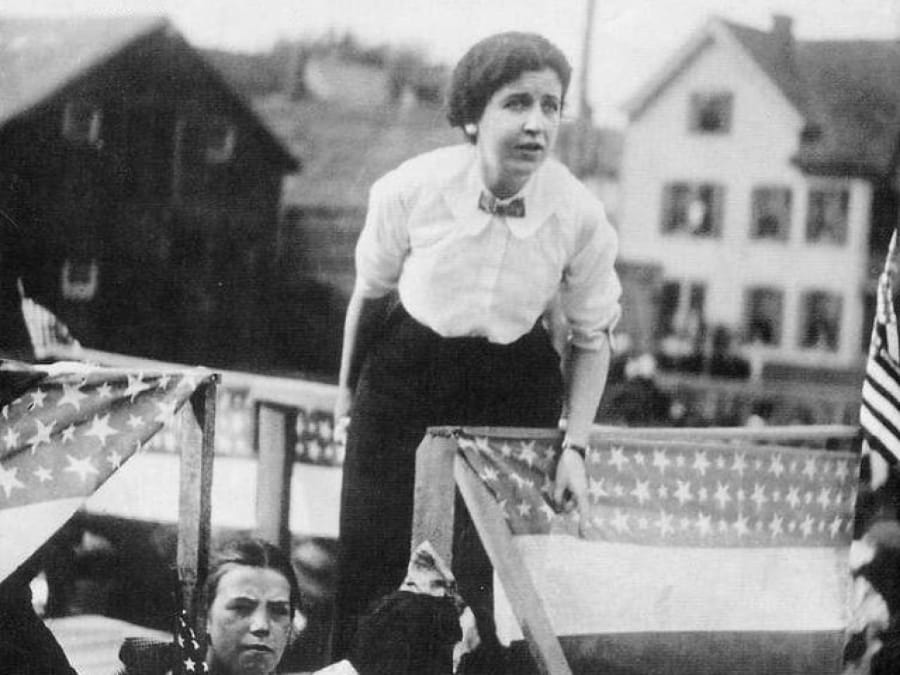Elizabeth Gurley Flynn never had much use for politicians.
“My, how terribly embarrassing it must be to each of you to say all those nice things about yourself,” she quipped at a 1915 candidates forum that had seen a phalanx of Portland City Council hopefuls speak.
She then launched into a speech of her own, even though she wasn’t running for any office. “Labor,” she exclaimed, “is the foundation of society.”
Flynn, who died in 1964 and quickly slipped into obscurity, is now having a pop-culture moment.
Credit for the revival goes to author Jess Walter, whose well-received new novel “The Cold Millions” adds Flynn to a bevy of memorable fictional characters during the 1909 free-speech battle in Spokane.
Walter captures Flynn’s hard-charging charisma, showing the 19-year-old socialist storming onstage at a rally, “purposefully striding toward the crowd like she might dive in, her toes stopping at the stage edge. She leaned forward. ‘Listen,’ took a few breaths, ‘brothers and sisters, have we ever seen such trying times?’ ”
Walter, who frequently sets his novels in his hometown of Spokane, told The Oregonian/OregonLive last month that the tension between labor and capital in the American economic system “is very much in my bones, the unfairness. And to see the way much of the working class has been separated from building in their own interests breaks my heart.”
This viewpoint perhaps inevitably brought him to Flynn, known in her heyday as “The Rebel Girl” and the “East Side Joan of Arc.” The Bronx-raised Flynn was a central figure in the real-life contretemps Walter limbs in “The Cold Millions,” when the revolutionary Industrial Workers of the World tried to overwhelm Spokane’s efforts to enforce an anti-union ordinance.
Stewart Holbrook, the bard of the Northwest before Walter, wrote of Flynn “shouting on a Trent Avenue corner for the workers to rise up, shake off their chains and do battle for free speech.” Her celebrity, Holbrook pointed out, was invaluable to the I.W.W. in Spokane: “fairly sober reporters affirmed that a flash from the girl’s blue-gray eyes would serve to light a Sweet Caporal [cigarette].”
The Lilac City battle would not be a Pacific Northwest one-off for Flynn — or for the I.W.W., better known as the Wobblies. Flynn regularly made appearances around the region for the “One Big Union” cause and to support various local strikes.
She especially liked Portland, coming through time and again to raise money and recruit workers.
“Either labor must rule or capital must rule,” she said in a speech at downtown’s Multnomah Hotel. “It’s a war for control, and we are quite frank about it.”
Four years after the Spokane upheaval, the I.W.W.’s fight for free speech reached the Rose City, when Mayor H. Russell Albee banned all “street speaking except religious speeches” in an effort to squash a strike at the Oregon Packing Co. on Southeast 8th Avenue at Belmont Street. The police told the strikers, most of whom were women, to “quit picketing, quit speaking, quit parading, or else face a jail sentence.” When the picketers still refused to disperse, a legion of mounted cops swooped in.
Flynn wasn’t involved in the strike at the Portland fruit cannery — she was back east leading silk-mill workers in New Jersey — but her friend Dr. Marie Equi waded into the fight and kept her apprised.
After helping to establish the American Civil Liberties Union, Flynn took up residence in Portland in the 1920s. By then she was suffering from persistent health problems. Long divorced from a Minnesota ore miner, she lived at Equi’s Southwest Portland home for years, too weak to rejoin the barricades. “I always felt I was in jail here,” she later said.
Flynn’s ill health “was not just physical,” says Michael Munk, a longtime chronicler of local radical history and author of the 2007 book “The Portland Red Guide.” “The way I understood it, she was kind of depressed.”
She had seen years of defeats, after all. Strikes that had petered out or been crushed, the conviction and execution of the anarchists Sacco and Vanzetti.
During the decade she spent living in the Rose City, Flynn, a dedicated socialist since her teens, moved further to the left. The Wobblies, Holbrook wrote, had dismissed the Communists as the “Comicals,” but in 1937 Flynn joined the American Communist Party. In the 1950s she was convicted of conspiracy under the anti-communist Smith Act and sentenced to three years behind bars.
It had been a long, winding road to federal prison for Flynn. Back in the days when she could spark a Sweet Caporal with a stern look, Flynn was considered a threat only to exploitative industrialists, not the entire U.S. political system. In her remarks that 1915 day at the Portland candidates’ forum, she offered the office-seekers a suggestion on how they could improve their stump speeches.
“Not one of you, with all your reference to economy, businesslike methods and so on, has made any reference to labor,” she said.
A late-arriving candidate, theatrical producer George Baker, spoke up. “You didn’t wait to hear me,” he said.
When his turn came, Baker abandoned his prepared remarks and, according to The Oregonian, insisted that his goal was to make Portland “a better city for the workingman and all other good citizens.”
Baker would win a council seat — and in 1917 he became Portland’s mayor.
Two years later, police raided the I.W.W.’s local headquarters on Southwest Second Ave., near Burnside. Mayor Baker, citing a new law designed to stop “the circulation of inflammatory literature” that encouraged general strikes, demanded that the Wobblies be evicted from their building and run out of the city.



